Micromegas and Other Short Fictions (Penguin ed.) Read online
Page 4
1756
Seven Years War begins. ‘Plato’s Dream’, ‘The History of the Travels of Scarmentado’, ‘The Consoler and the Consoled’ published; also Essai sur les mœurs (Essay on the Manners and Spirit of the Nations), Voltaire’s great world history.
1757
Encyclopédie suspended by the government, after publication of controversial articles in vol. VII.
1759
‘Account of the Jesuit Berthier’, ‘Candide’ published. Voltaire settles at Château de Ferney, just outside Geneva.
1760–67
Sterne’s Tristram Shandy published.
1761
‘The Story of a Good Brahmin’, ‘Dialogue between a Savage and a Graduate’, ‘Dialogue between Ariste and Acrotal’ published.
1762
Catherine II ascends the throne as Empress of Russia.
1762–5
Voltaire’s great campaign, eventually successful, to rehabilitate the posthumous reputation of Jean Calas, Protestant merchant of Toulouse, wrongfully condemned for the murder of his son. This forms part of a general crusade against ‘l’Infâme’ (‘the Infamous one’), i.e. the intolerance and persecution practised by the Catholic Church.
1764
Dictionnaire philosophique published.
1765
‘Pot-Pourri’, ‘The Education of Daughters’, ‘Wives, Submit Yourselves to Your Husbands’, ‘Dialogue between the Cock and the Hen’ published.
1766
‘Conversation between Lucian, Erasmus and Rabelais’ published.
1767
‘L’Ingénu’ (‘The Naïve One’), the most important conte of later years, published.
1774
Louis XV dies; Louis XVI succeeds.
1775
‘Lord Chesterfield’s Ears’ published.
1778
Voltaire leaves Ferney to visit Paris, after an absence of nearly 28 years. The return becomes a glorious triumph; but Voltaire dies there, 30 May.
FURTHER READING
EDITIONS
Frédéric Deloffre and Jacques Van den Heuvel (eds.), Voltaire: Romans et contes (Paris: Bibl. de la Pléiade, Gallimard, 1979). The essential work for any study in depth of the prose tales: rigorous scholarship, allied to excellent critical surveys.
Sylvain Menant (ed.), Voltaire: Contes en vers et en prose, 2 vols. (Paris: Garnier, 1992–3). Most complete and serviceable of present-day editions; created a precedent by including Voltaire’s verse contes alongside the prose narratives.
Roger Pearson (trans. and ed.), Voltaire: Candide and Other Stories (Oxford: Oxford University Press, 1990). Excellent introduction, translated texts and notes. Limited to five of the major contes.
Jacques Van den Heuvel (ed.), Voltaire: Mélanges (Paris: Bibl. de la Pléiade, Gallimard, 1961). One of the few collections of the Mélanges. Editing apparatus is scholarly and sound, but limited.
STUDIES: GENERAL
René Pomeau, La Religion de Voltaire, rev. edn. (Paris: Nizet, 1969). The indispensable intellectual biography of our time.
René Pomeau et al., Voltaire en son temps, 5 vols. (Oxford: Voltaire Foundation, 1985–94). Fundamental account of Voltaire’s life and times.
Christiane Mervaud, Voltaire en toutes lettres (Paris: Bordas, 1991). Brilliantly concise survey.
Haydn Mason, Voltaire: A Biography (London: Granada, 1981).
Haydn Mason, Voltaire (London: Hutchinson, 1975). A general study of his works.
STUDIES: SPECIFIC
Jacques Van den Heuvel, Voltaire dans ses contes (Paris: Colin, 1967). Most thorough investigation of the subject, richly stimulating, but tends to overdo the biographical approach, and concentrates on the major contes.
Roger Pearson, The Fables of Reason: A Study of Voltaire’s Contes philosophiques (Oxford: Clarendon Press, 1993). The most complete coverage, dealing with all twenty-six prose contes in a wholly reliable manner.
Robin Howells, Disabled Powers: A Reading of Voltaire’s Contes (Amsterdam and Atlanta: Rodopi, 1993). An imaginatively fertile study, with reference to the Bakhtinian concept of carnival.
S. S. B. Taylor, ‘Voltaire’s Humour’ (Voltaire and the English), Studies on Voltaire and the Eighteenth Century, 179 (1979), pp. 101–16. Remains the best succinct account of an essential aspect of Voltaire.
The classic edition of Voltaire is the Complete Works (Oxford: Voltaire Foundation, 1968– ), with individual editions variously introduced in English and French of Voltaire’s original texts.
NOTE ON THE TEXTS
The translations in this volume are based on the texts of the following editions: for the prose contes: Voltaire: Romans et contes, ed. Frédéric Deloffre and Jacques Van den Heuvel (Paris: Bibl. de la Pléiade, Gallimard, 1979); for ‘Cuckoldage’: Voltaire: Contes en vers et en prose, vol. i, ed. Sylvain Menant (Paris: Garnier, 1992–3); for the mélanges: Voltaire: Mélanges, ed. Jacques Van den Heuvel (Paris: Bibl. de la Pléiade, Gallimard, 1961).
Grateful thanks are due to Cambridge University Press for permission to reprint ‘Dialogue between the Cock and the Hen’, translated by Haydn and Adrienne Mason, from Comparative Criticism, 20 (1998), copyright Cambridge University Press.
TRANSLATOR’S NOTE
The allegro con brio of Voltaire’s style is his great achievement. There are dark shadows in the miniature world of these fictions, but at the level of language all is rapidity, transparency, felicity. Put simply, Voltaire’s prose may engage with the worst of worlds, but it lives in the best of times. This is what Roland Barthes meant when he described the embattled Voltaire as paradoxically the ‘last happy writer’, basking in the high noon of expression.
There are many reefs here for the modern translator. First, it has been remarked that the contes (‘Candide’ above all) are written in such a way that the reader has to perform them mentally at a given speed; the translator can only attempt to keep up with the vehicle and its abrupt changes of direction. Secondly, Voltaire’s register is chaste, his vocabulary unexceptional, often ironically formulaic – unresonating, unfigurative, functional. It tempts the translator to introduce more specificity – to replace a simple verb with a more interesting verb, a small word with a big word, a colourless epithet with a colourful one. Thirdly, it is a style at once pared down yet full of apparent redundancy: intensifiers which do not intensify, qualifiers which fail to qualify. All of which is essential to Voltaire’s foreshortening, to the laconic comedy of his story-telling, its imponderably cool textures, its dozing horrors. The compression is above all syntactical, determined by Voltaire’s sentences. It seems equally mistaken for a translator to break these up or run them together. They are rooms, interconnecting via an expressive and rhythmic use of punctuation. Voltaire’s paragraphs are chain reactions.
The overall temptation is to render Voltaire’s anarchic comedy as merely arch, whereas its elegance is mordant. An unfailingly fluent translation, taking the usual liberties (described above), amounts to a retelling – and it is easy to slip into bowdlerizing Voltaire. His neutrality is deceptive; the prose is abrupt, atavistic, urbane – what it is not is fluent, euphuistic, bland. The danger lies in producing a fat version of a thin work; the tendency of English with its synonyms and its genius for variation is to make Voltaire’s words put on weight. Like Mozart, Voltaire composed on a five-octave keyboard, not a concert grand.
I should like to thank Haydn Mason for his many suggestions in helping this translation to lose some weight and gain some precision.
CONTES
Cuckoldage
In times past Jove, jealous of his wife by whose sport he was made a father, brought forth a daughter from his own head, saying: ‘Well at least this one is mine.’ The good Vulcan likewise, obliged for his pains by the Olympian court to marry Venus, also wished for a little baby of whom he could be sure he alone was the father: for it was beyond him to believe that the lovely Cupid, and the little cupids, those ornaments of Cythera,1 who, though children, can teach
the arts of pleasing, were the offspring of a simple blacksmith like himself. He filled the house with his din; cares and sorrows racked his spirit, jealous suspicions hammered at his brain. A score of times a day he reproached his spouse for her superabundant charms, a dangerous asset. Poor Vulcan made such a commotion that his brain gave birth – to what? to Cuckoldage. This is the god adored in Paris, this the baleful deity, the scourge of husbands. The moment he was born he tried out his infant wrath on his father’s head. His novice hands stamped the paternal brow with the first sign of horns,2 the eternal insult. Hardly had this fledgling’s feathers appeared than he made divine war on the gentle Hymen.3 He could be seen, importuning that god in every place, seizing his possessions before his eyes, going from one household to the next, sometimes bearing flames and destruction, with firebrands in hand lighting up his spoils for all to see; at other times creeping in silent shadow, brow veiled in innocence, the sly one within a husband’s home, turning a trick without scandal or sound. Jealousy, with pale and livid flush, and Malice, with false and perfidious gaze, guide his steps to where love leads on, followed uncaringly by Sensuality. His quivers are filled with various shafts, for the conquest of both husbands and their fair wives; arrows are there to pierce reluctant ladies’ hearts, horns are there for husbands’ brows. Now, a god like this, malicious or not, fully merits that his offices be sung; and, whether from necessity or prudence, we must offer him our devotions, our incense and our candles. Married or unmarried, whether one acts or lives in fear, one must ever court his favours. O Iris,4 whom I shall always love, when you were still in command of your own wishes, ere a contract upon your affections had yet enslaved your bright days, I invoked only the god of love: but now that Hymen, father of sadness, has placed you beneath his rule, to Cuckoldage must I now turn: he is the only god in whom I can believe.
The One-eyed Porter
Having two eyes does not improve our lot; the one serves to show us the good things in life, the other its evils. Many people have the regrettable habit of closing the first, and too few close the second; which is why there are so many who would prefer to be blind than to see what they do see. Happy the one-eyed, who are deprived only of this bad eye which spoils everything it looks upon! Take Mesrour as an example.
One would have had to be blind not to see that Mesrour was one-eyed. He was thus from birth; but here was a one-eyed man so content with his lot that he had never taken it into his head to wish for a second eye. Nor was it the gifts of fortune that consoled him for the wrongs of nature, for he was a simple porter with no worldly goods except for his strong shoulders; but he was happy, and was proof that more eyes and fewer cares contribute rather little to happiness. Money and appetite always arrived together, in proportion to his exertions; he worked in the mornings, ate and drank in the evenings, slept at night, and looked upon all his days as so many separate lifetimes, so that thoughts of the future never troubled his enjoyment of the present. As you can see, he was at the same time one-eyed, a porter, and a philosopher.
When he chanced one day to see a great princess passing in a brilliant carriage, with one eye more than his, this did not prevent him from finding her very beautiful, and, since the one-eyed differ from other men only in having one eye the less, he fell frantically in love with her. It will perhaps be said that a porter with one eye should at all costs avoid falling in love, particularly with a great princess, and most particularly, a princess with two eyes: I admit there is something to be feared here from not pleasing; however, since there is no love without hope, and our porter was in love, he hoped.
Since he had more legs than eyes, and good ones at that, he kept up with the carriage of his goddess for a distance of four leagues, drawn though it was at a rapid pace by six large white horses. The fashion in those days, among the ladies, was to travel around without lackeys, or coachmen, and to drive oneself: husbands preferred wives to be at all times alone, so as to be more certain of their virtue; which goes directly counter to the view of moralists, who say there is no virtue in solitude.
Mesrour was still running alongside the wheels of the carriage, keeping his good eye on the side of the lady, who was astonished to see a one-eyed man of such agility. While he was proving in this way how indefatigable we are in the service of love, a wild beast pursued by hunters ran across the highway and startled the horses, who, with the bit between their teeth, were now pulling the beauty over a precipice. Her new admirer, more fearful even than herself, though she was very fearful too, uncoupled the traces with admirable dexterity; the six white horses made the perilous leap alone, and the lady, who was no less white, escaped with nothing worse than a scare.
‘Whoever you are,’ said she, ‘I shall never forget that I owe my life to you; ask of me what you will: all I have is yours.’
‘Ah, Madame,’ said Mesrour, ‘I could with much more reason offer you the same; but to offer this, I would be offering you far less: I have but one eye, and you have two; though one eye which looks at you is worth two that cannot see yours.’
The lady smiled: for the gallantries of a one-eyed man are gallantries nevertheless, and gallantries always make a lady smile.
‘Would I were able to offer you another eye, but only your mother could have made you such a present; follow me nonetheless.’
So saying she descended from her carriage and continued on foot; her little dog descended too and walked beside her, barking at her strangely visaged equerry. I am wrong to give him the title of equerry, for try as he might to offer his arm, the lady would not accept, on the grounds that he was too dirty; and as we shall see, she was the dupe of her own scruples. She had tiny feet, and her shoes were even tinier than her feet, with the result that she was neither shaped nor shod for a long march.
Pretty feet are a consolation for indifferent legs, when one spends one’s days on a chaise longue amidst a crowd of fops; but of what use on a stony path are shoes embroidered with sequins, where they can be admired only by a porter, and a one-eyed porter at that?
Mélinade (the name of the lady, which I had my reasons for withholding, not having thought of it until now) made such progress as she could, cursing her shoemaker, tearing her shoes, grazing her feet, spraining herself at every step. She had been walking for about an hour and a half, at a pace befitting a fine lady, which is to say she had covered about a quarter of a league, when she dropped to the ground exhausted.
Mesrour, whose assistance she had refused while upright, debated whether to offer it now, fearful of dirtying her by his touch; for he was well aware that he was not clean, the lady having given him to understand this quite unequivocally, and the comparisons he had been making along the road between himself and his mistress made him see it even more clearly. She was wearing a silver dress of light fabric, sprinkled with garlands of flowers, which allowed the beauty of her figure to blaze forth; he was wearing a brown smock stained in a hundred places, patched and holed in such fashion that the patches were beside the holes, rather than above them, where they would have been more to the point. He had likewise been comparing his hands, sinewy and callused, with her two tiny hands whiter and more delicate than the lily. Finally, he had seen the beautiful blond hair of Mélinade, which showed through a light gauze veil, some of it held up in tresses and the rest in curls and loops; whereas he sported a black bristling frizzy mane, with only a torn turban for ornament.
Meanwhile Mélinade was trying to get up, but she soon fell back again, and in so revealing a posture as to drive from Mesrour’s head what little sense the sight of her face had left him with in the first place. He forgot that he was a porter, that he was one-eyed; he no longer reflected on the distance fate had set between himself and Mélinade; he scarcely remembered that he was a lover, for he lacked that delicacy which is said to be inseparable from true love, and which sometimes constitutes its charm but more frequently its tedium; he made use of the advantages which his condition of porter gave him in the way of brutality; he acted brutally, and was satisfie
d. At this point the princess no doubt fainted, or else bemoaned her fate; but since she was a just princess, she surely blessed the gods for such consolations as attend all misfortune.
Night had cast its veils over the horizon, and hid in darkness the true fortunes of Mesrour and the apparent misfortunes of Mélinade; Mesrour tasted the joys of consummate lovers, and he tasted them as a porter, which is to say (to humanity’s shame) consummately; the faintness of Mélinade returned at each instant, and at each instant her lover’s powers returned. ‘All-Powerful Mohammed,’ he said at one point, as a man transported (but a very poor Catholic), ‘all that is lacking to complete my felicity is for it to be shared by her who is its cause. While I am in your paradise, divine prophet, grant me one more favour, which is to appear in Mélinade’s eyes as she would appear to my one eye were it now daylight.’ He finished praying, and continued enjoying. Aurora, always too diligent as far as lovers are concerned, surprised Mesrour and Mélinade in the position in which she herself might have been surprised with Tithonus1 a moment earlier. But imagine the astonishment of Mélinade when, opening her eyes to the first rays of daylight, she found herself in an enchanted spot with a young man of noble bearing, whose face resembled the day star for whose return the earth was just now preparing! He had rosy cheeks, and lips of coral; his large eyes, at once tender and piercing, expressed and inspired voluptuousness; a golden quiver, encrusted with precious stones, hung from his shoulders, and pleasure alone made his arrows jingle; his long hair, held back by a diamond fastener, streamed down to his waist, and a transparent gauze, embroidered with pearls, served for clothing and hid nothing of the beauty of his body.

 Zadig/L'Ingénu
Zadig/L'Ingénu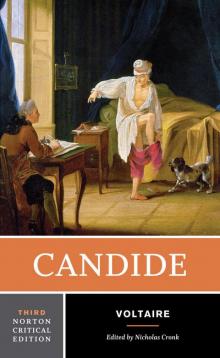 Candide
Candide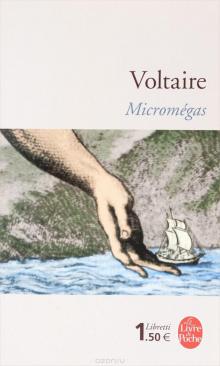 Micromegas
Micromegas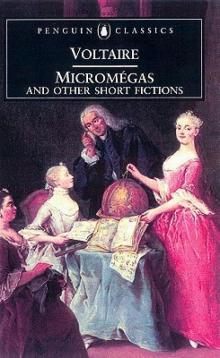 Micromegas and Other Short Fictions (Penguin ed.)
Micromegas and Other Short Fictions (Penguin ed.)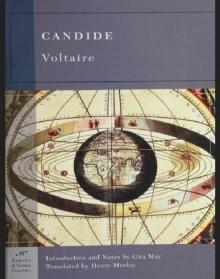 Candide (Barnes & Noble Classics Series)
Candide (Barnes & Noble Classics Series)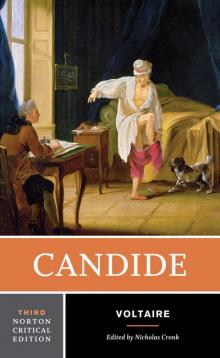 Candide (Third Edition) (Norton Critical Editions)
Candide (Third Edition) (Norton Critical Editions) Zadig or L'Ingenu
Zadig or L'Ingenu